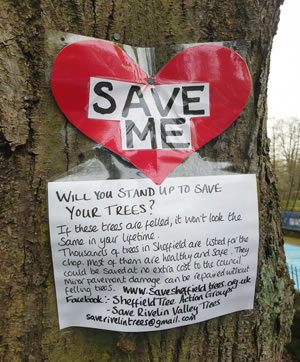Facebooking felines and dogs debating on Twitter? There’s something about adopting the voices of their pets that frees people up on social media to express themselves. But there’s a new phenomenon that’s recently taken off in the Yorkshire city of Sheffield – tweeting trees.
The trend began because many much-loved and valued trees in Sheffield are threatened by a controversial felling programme being carried out by a multinational company. The fellings have attracted worldwide attention, seen people arrested for protesting, and caused political ructions.
A city once renowned for its steel-making, but which today boasts its green credentials, with more ancient forest within its boundaries than any other, Sheffield has seen some of its streets transformed from leafy oases to barren canyons by the fellings. Many more trees are threatened – those in danger often marked by yellow ribbons and paper hearts.
The tweeted voices of @EllenLimeTree, @VernonOak,
@TheDukesTree and others have been one way in which residents have tried to voice their distress. It’s an emotional response to a cold reality of loss.
There are many reasons why Sheffield’s trees should not be felled. In a city with very high pollution levels, they are essential air filters for quiet suburban and busy arterial roads alike. And the ‘dawn raid’ in one street, Rustlings Road – residents were woken by police and told they had to move their cars or have them towed away, and the chainsaws started at 5am – came the same day as a nearby roundabout flooded after heavy rain, a reminder of another service trees provide: flood prevention.
Trees obviously make the streets more pleasant, tranquil environments. Estate agents will tell you that homes on tree-lined streets are more prized than those on their treeless near-neighbours. They’re also valued, valuable homes for wildlife – one expert told me he was astonished that trees in one area were being marked for destruction, because they’re almost certainly bat roosts, which it is illegal to destroy.
The trees are also part of community history. The Western Road avenue was planted after the first world war to commemorate pupils from Westways school who lost their lives in the slaughter. Ninety-six were planted, and 60 survived until the start of the current cull, when 23 faced the chainsaws.
Every tree has a story for local residents – this is the one under whose branches they met their first boyfriend or girlfriend; that one is where children used to gather. One woman wrote: “To me this tree is beautiful. My husband loves how wild the tree is in winter and the bend in its camouflage-coloured trunk. It’s alive, it gives life and, like each of us in this motley road, it’s unique.”
It’s not surprising, then, that the tree-felling programme has been met by the growth of a strong protection group, a whole forest of local organisations under the umbrella of Sheffield Tree Action Groups (STAG).
They’ve petitioned, they’ve written letters and delivered leaflets, they’ve held packed public meetings. Some members of the campaign groups have simply stood under threatened trees and been arrested for their actions, under legislation supposedly designed to address aggressive picketing.
Responsibility for the decision to fell the trees rests with Sheffield City Council, but management of the streets, the pavements and the trees has been outsourced under a controversial private finance initiative (PFI) contract to Amey, the multinational services company, for 25 years.
As a commercial company, Amey’s job is to maximise profits for its owners. But that obligation has proved entirely at odds with the public good of Sheffield. For a mature tree in an urban environment requires maintenance. Paving around it may need to be flexible to allow its roots the space they need – kerbstones may need to be adjusted, for example.
That’s a cost other cities seem comfortable to bear, but Amey would rather replace the trees with small, ‘lollipop’ versions, which won’t reach any size at all, minimising maintenance costs over the term of their contract.
There’s no doubt that the management of the trees has been neglected, and a 2007 report suggested that 1,000 trees around the city would need to be felled. But now more than 4,000 have been taken out.
This is a highly visible example of a far broader problem affecting many British institutions – the privatisation of services.
We can’t see the contract under which Amey’s operating – commercial confidentiality, we’re told, something that shouldn’t apply to any public provision – and we also know that the council has decimated its professional staff, who could have overseen the company and insisted on decisions for the public good. As a result, we’re left with a city far poorer, a company getting richer – and Sheffield’s green credentials under scrutiny.








